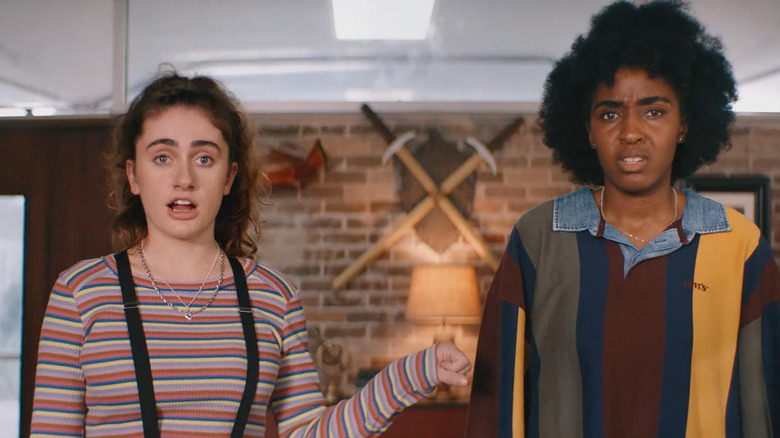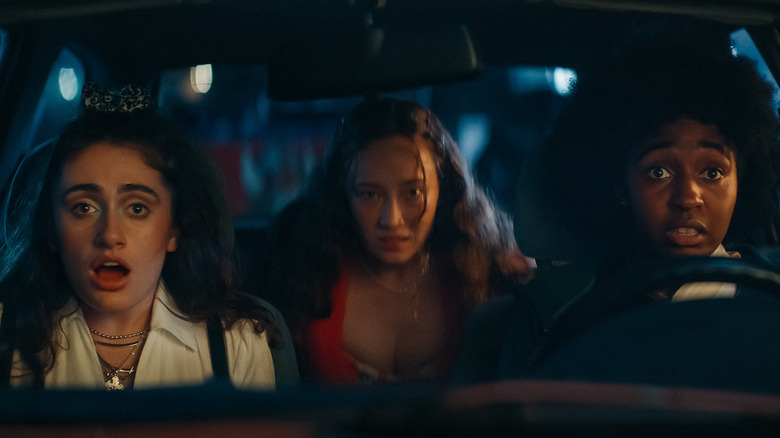How The Archdiocese Of New Orleans Sabotaged Crucial Bottoms Locations
Unpopular best friends PJ and Josie start a high school fight club to get closer to the girls they have crushes on in the hopes of losing their virginities, but they soon realize they're in too deep when the most popular kids in school start molly-whopping each other in the name of self-defense. That's the synopsis of Emma Seligman's new film "Bottoms," starring Rachel Sennott ("Bodies Bodies Bodies," "Shiva Baby") and Ayo Edebiri ("The Bear," "Teenage Mutant Ninja Turtles: Mutant Mayhem"). The teen comedy made waves during the SXSW film festival, and although only theatrically released in select cities, is already picking up crucial word of mouth from an often-overlooked demographic of movie-goers: yearning lesbians.
"Bottoms" is rightfully raunchy, and completely uninterested in playing it safe to appease the homophobic status quo (or the puritanical members of the LGBTQIA+ community who think we need to assimilate to said status quo in order to be worthy of respect). The film was shot in and around New Orleans, but the unflinching sexuality of the film's plot put a spotlight on how many groups and organizations are still openly homophobic. There was predictable pushback from the Archdiocese of New Orleans, who used their power and influence to dissuade filming location requests. Schools, football fields, and community centers all said "No." Seligman learned that the Archdiocese read about the film in an article in W Magazine, joking with Vulture, "My first reaction was, The Archdiocese reads W mag?"
Unfortunately, the Archdiocese has "a lot of sway over these places," according to Seligman, much like how even the most seemingly progressive corporations will consistently bend to the whims of the zealous, religious right.
Performative allyship hits rock Bottoms
Fortunately, they were able to secure an abandoned elementary school and Dillard University, a small HBCU (Historically Black Colleges and Universities), to shoot their school scenes. But the homophobia didn't stop there. Seligman also said that securing product placement was essentially a non-starter, including those so-called "progressive" corporations because they were all "too offended by the content" of the film. Seligman hasn't outed any of these gutless worms (my words, not hers) but she did say, "Just think of any liberal corporation that has a Pride float. They were like, 'Not only will we not do something with you, but do not put anything of ours in there.' It was really disheartening."
At this point, I wish I could say that I'm shocked or disappointed, but 2023 Pride was an absolute joke of companies waving pride flags while donating huge sums of money to anti-LGBTQIA+ legislative groups or partnering with famous activists only to double back out of fear that they'd lose the business from the kind of people who want us dead. If you hate us, say it with your chest and quit wasting time with lip service, you pathetic losers! Do I sound angry? It's because I'm angry. That's my secret, Cap (err, reader), I'm always angry.
Fortunately, "Bottoms" is one of the best comedy films of the year, and no amount of hate-fueled fear-mongering or bigoted nonsense can change that. Ignorant haters can deny queer artists funding, locations, and product placements to make art all they want, but it won't make their weirdo propaganda films any better.
"Bottoms" is now playing in select theaters.

